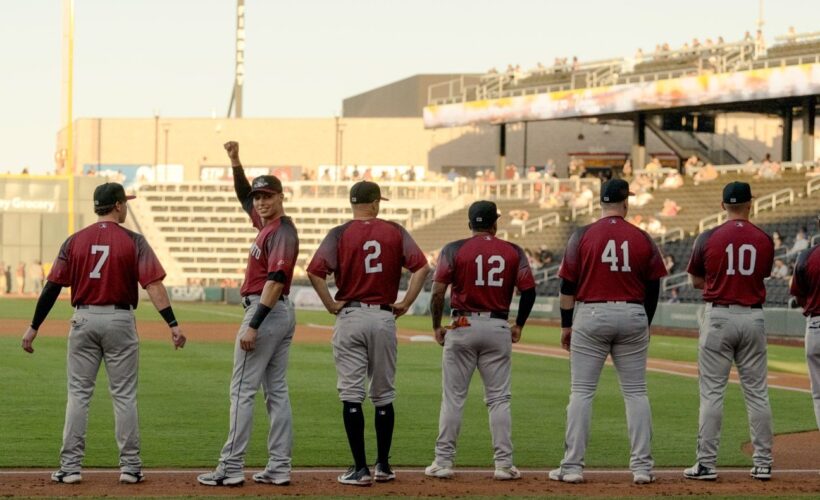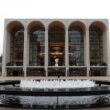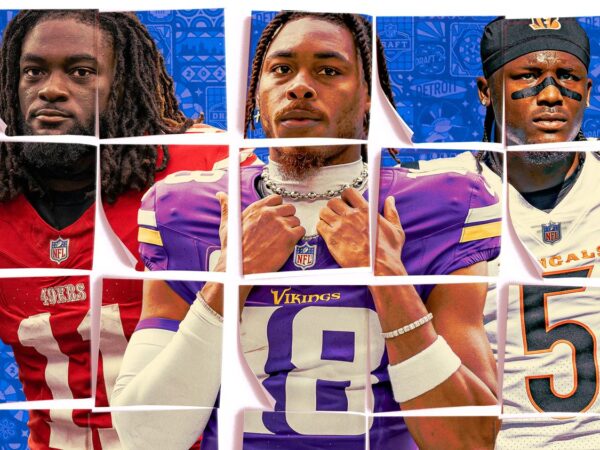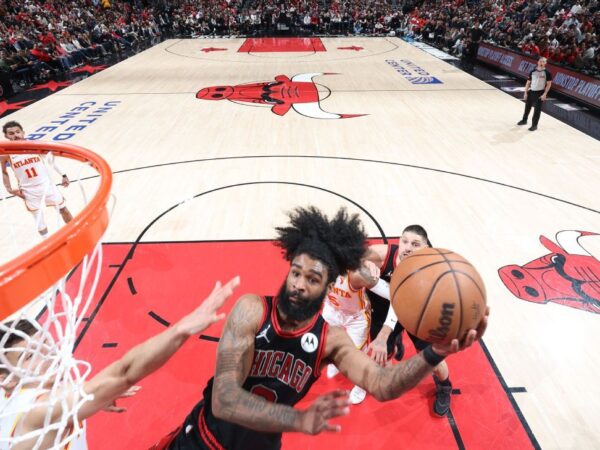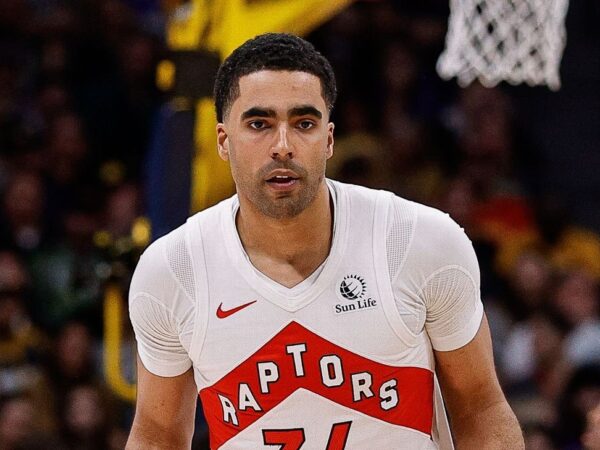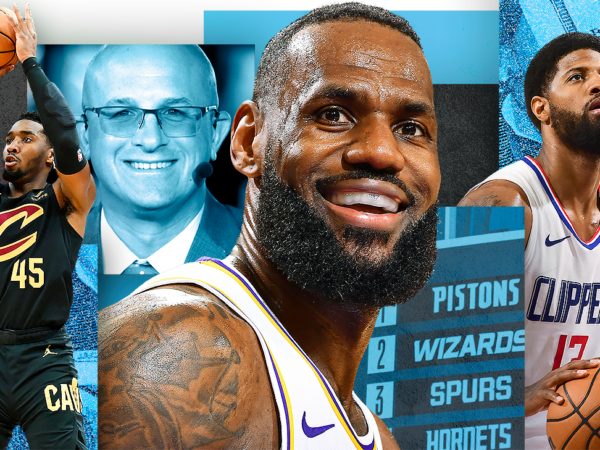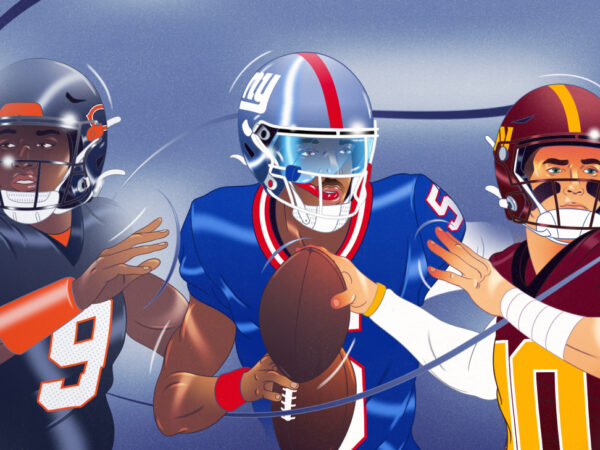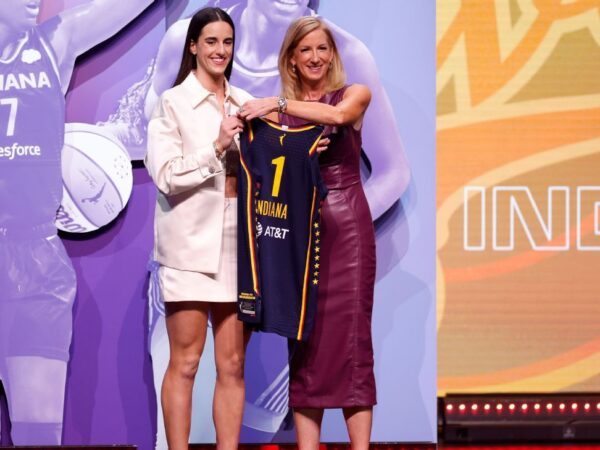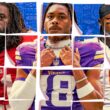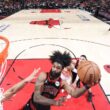EVERYTHING IS MOVING so fast for Drew Robinson, sometimes too fast, and on Saturday night, the object traveling toward him at an uncomfortable velocity was a batted ball, lined to left field, where Drew was playing his third game for the Sacramento River Cats, the Triple-A affiliate of the San Francisco Giants.
Baseball doesn’t come as easy as it once did, though that’s to be expected. When Drew first tried to adjust to life without his right eye, simple things like filling a cup with water were difficult. Now the ball screaming toward Drew is the latest test, another referendum on whether he belongs here. It could hiss right by him and skip to the wall, lending a little more credence to those who can’t see what he’s doing for what it is: a miracle.
Drew Robinson is playing professional baseball with one eye, a little more than a year after he lost it in a suicide attempt. Thirteen months ago, Drew wasn’t sure his life was worth living, and now he’s attempting to find peace in the game that helped steer him to his lowest moment. A game rooted in failure and sodden with heartache. A game that lured Drew back and convinced him that he needed to play.
He needed it for moments like this one, another box to check. Three innings earlier, Drew recorded his first official hit since June 24, 2019, but he had lashed those in exhibitions all spring. Not once on Drew’s comeback trail had he dived to catch a baseball. And here was a shot to left, fading quickly, and six strides into his pursuit, he realized he was going to need to fully lay out to steal a hit.
“I was panicking,” Drew says a day later. “Second-guessing myself. Wondering if I was judging it right.”
He does this still. Not nearly as much as he used to, but the questions — about his route to an arcing baseball or the things that drove him to an attempt to take his own life — won’t ever go away completely. The bullet did not rid him of his brain’s instinct to gravitate to the darkest places. It simply taught him that he must learn how to live with them.
So he dived. He sprang off his left leg and Superman’d his 6-foot-1, 200-pound frame and took a literal leap of faith, in front of the family that was there supporting him and the fans who were there in awe of him and the people streaming the game who were rooting for him. He made the calculation that the greatness of what he might do outweighed the downside of what he might not. For months, he had preached to himself and to anyone who would listen the power of vulnerability, and now he was living by his own words.
And at Las Vegas Ballpark, 2 miles physically and a million metaphorically from the house where he had tried to kill himself, Drew Robinson opened his glove and felt the ball settle into its pocket. As he rose to his feet, the inning over, his mom and dad and sister and brother and best friend screamed and fought back tears.
Drew had shed plenty already that week. This was validation that everything he’d done to get here was worth it, sure, but it was more than that. The outfield is a lonely place — just you and what feels like an acre of grass, no safety net, nothing there for protection. It’s a place he hadn’t been in so long, but he found that reacquainting himself with it also helped him reacclimate to a world that can be solitary and unforgiving. Lessons can be imparted in the unlikeliest of ways, and Drew was beginning to recognize that some of his most profound were coming from a game.
“Baseball,” he says, “was teaching me a lot without me even being aware of it.”
WHEN MENTAL ILLNESS infiltrates the mind, it refuses to relent. Even now, with regular therapy and medication to help stave off depression, Drew’s brain sets traps. Imagine, he says, being in the shower and dropping a bar of soap. For most, it’s a little inconvenience, a fleeting nuisance. For Drew, it turns into a referendum. He has to combat the instinct to belittle himself, to extrapolate this tiny, inconsequential thing that to him feels like it means more — that letting the soap slip makes him a failure and that having to pick it up makes him stupid. He knows it’s absurd. That doesn’t always help it go away.
“Sometimes in your head it just seems justified to point out that negative moment or point out that mistake, like just really fixate on it,” he says. “Because you’re in your head, you’re spiraling, but I’ve grown to be so familiar with misery that falling back into those habits feels comfortable. Because it’s where I was and all that I knew.”
This is Drew Robinson’s fight. It is one he will wage today and tomorrow and for the remainder of his life. And it’s one that, since he shared his remarkable story of survival with ESPN in February — 20 hours spent with a wound in his head trying to reconcile whether he wanted to live — he has tried to share more widely. Robinson believed he could speak to the tens of millions of Americans who every year contemplate suicide. He could provide hope to the hopeless and help destigmatize suicide while emphasizing its perils.
He has spoken on podcasts and to small groups and found himself far more recognizable than he ever was as a member of the Texas Rangers and St. Louis Cardinals from 2017 to 2019. He has tried to balance his necessary optimism with the truth that he doesn’t have an answer for everything — that as rosy as he’d love his life to be, as often as he sees steps in the right direction, there will always be bad days.
While he tried to give to others, Drew didn’t skimp on himself. On April 17, 2020, the day after he attempted suicide, the day of his first of four surgeries to rebuild his head, Drew was thinking about baseball. He didn’t yet know that doctors would remove his right eye or that he would lose 30 pounds and most of his muscle. He did know that he was already wondering whether he would play again.
Drew’s recalibration started with the simplest of things: a routine. Every morning, he wakes up and drinks an oversized bottle of water and a green smoothie. Then he meditates and journals. He turns on “Friends,” makes breakfast and eats. He plays with his goldendoodle, Ellie. Then he goes to the field and starts to work.
When he was in Las Vegas over the winter, Drew’s support system insulated him. If he needed to talk, his best friend, Daiana Anguelova, was there. So were his mother, Renee, and his father, Darryl, and his sister, Britney, and his brother, Chad. Their relationships, strained throughout the years, strengthened. They talked. They spent time together. They remade their family into the foundation upon which Drew could fabricate the next part of his life: baseball.
Nothing, of course, could prepare him for that. This spring would be one giant outfield — Drew, by himself, outside of the cocoon he and those around him had created, for the first time since April 2020. Life hitting him line drives every day.
“There’s going to be a pretty big learning curve with this,” Drew says. “And it’s going to be really uncomfortable and really challenging.
“I’m trying to understand what I’m doing is really hard. Even when I had two eyes, baseball was hard. I also don’t want to be a charity case. I’m trying to prove I deserve this spot. Trying to find that middle ground of appreciating things when they’re going wrong but trying to take advantage of this incredible opportunity.”
IN EARLY APRIL, as his comeback started, Drew called Daiana a few times and said, “I think I’m done.” The beginning of spring wasn’t going as planned. The Giants, with whom he had signed before the 2020 season, envisioned him as a utility infielder and wanted him at shortstop, a position he hadn’t played regularly since high school. Between the errors there and the consistent swings and misses — Drew had struck out 102 times in his 100 major league games, so that was nothing new — skepticism crept in.
“I’m finding that this is way harder than playing baseball before because I have a new level of self-doubt. Every time I’m not perfect I can jump to, I have one eye, I shouldn’t be here. I shouldn’t be out here doing this right now,” Drew says. “I started brainstorming about my next step for when I got home in the beginning of May. What we would do next, basically.”
Daiana knew this side of him better than anyone. They had dated on and off for years and were engaged before he called the wedding off in early 2020. She saw him weather one minor league season in which he batted .200 and another in which he hit .198. She comforted him as he shuttled between the major leagues and minor leagues. She still believed in Drew, in the idea that the work he put in would pay off eventually. Her conviction emboldened him.
The first game at Giants minor league spring camp was April 12. Drew woke up early and arrived at the complex at 6:40 a.m. He was often the first one there, embracing the fact that, at 29, he was older than almost everyone in camp and needed to set an example with his toil. He had regained all the muscle he lost last year and showed up imposing and shredded. Half the eyes, twice the work ethic.
He batted leadoff and played shortstop. In his first professional at-bat since the previous March, in the most anticipated plate appearance of his life, Drew hit a check-swing dribbler. As he ran down the first-base line, he cursed himself aloud.
“I went to that place that I used to go to,” Drew said after the game. “Throughout this last week and a half of getting back into the baseball grind, I’ve been finding a lot of old thought habits have been arising again. I’m really trying to focus on shortening that window of some bad self-talk that I fall into, getting back to a better, positive perspective and mindset.”
This wasn’t entirely surprising. The previous 12 months had tested Drew. It was more than just trying to recapture his baseball glory. He picked that up far quicker than any reasonable person would have believed of a left-handed hitter without his right eye. In his first batting-practice session, he sprayed line drives. When he switched to pitches from a breaking-ball machine, Drew found no trouble adjusting. He walloped home runs in his live at-bats, against major-league-quality pitchers. He held his own working out with Bryce Harper and other big leaguers who call Las Vegas home.
But some days proved tougher than others. He had passive suicidal thoughts, a common occurrence for suicide-attempt survivors. “I’ve definitely questioned myself and questioned what I’m doing, like if it’s even real, if I’m a fake or if I’m a phony, because I still have those thoughts,” Drew says. “But again, I think that’s what makes this all so real and so powerful and so authentic.”
The knowledge that he had survived, that he had been through so much worse than a check swing and some errors and a few strikeouts, heartened Drew through his early struggles at camp. So, too, did the excitement of what was coming: the one-year anniversary of his alive day. Daiana, Renee, Darryl, Britney and Chad came to visit Arizona on April 16 and brought with them a multitude of gifts. Their presence was the best, though what Daiana had done earlier in the week came close. She had reached out to Drew’s closest family and friends with a note and a request. Send a video, she said, of anything you would like to say to Drew.
Everyone replied. With stories of thanks and plaudits for his courage and admiration for his fortitude and love for who he is. The videos reminded Drew of just how incredible it is that he was here, alive, let alone here at spring training. They buoyed him as he started to make solid contact, as he remembered what it felt like to be a ballplayer. On April 21 came the clearest sign yet: Zac Reininger, a reliever for three seasons with Detroit, hung a slider. Drew hammered it over the center-field fence. Four days later, he blasted another home run, this one almost 450 feet. The Giants ended the shortstop experiment and stuck Drew in the outfield, where he was far more comfortable. He enlisted Justin Bour, the longtime major leaguer also in camp, to be his accountability partner and ensure his body language never sent the wrong message.
“I’ve had switches go off,” Drew says. “I’ve had realizations happen these last 12 months that I’ve been through it before. Not the exact situation or setting or environment, but I have proof that I can get through these things. This is just another one of those hurdles that I have to get over.”
On April 27, two days after Drew’s second home run, the Giants settled on their minor league rosters. The team’s farm director, Kyle Haines, summoned Drew off the field during batting practice. He wanted to tell him personally: Drew had made the cut and would start the season in Triple-A.
Drew did everything he could not to wrap Haines in a bear hug. The doubt, the fear, the negativity — it was all for naught. Drew Robinson was officially a professional baseball player again. And, having cheated and snuck a glance at the River Cats’ schedule, he knew what it meant: He would play his first regular-season game in nearly two years in, of all places, Las Vegas.
EVEN ON HIS worst days, when the pressure of being a major league baseball player felt like it was crushing him, Drew never showed his pain and anguish. It’s why his suicide attempt surprised everyone who knew him. He was too good at hiding what he felt. Over the past 13 months, Drew had tried to rid himself of that instinct. Emotion isn’t a weakness; it is a gift. And without it, he wouldn’t have been able to appreciate May 6 like he did.
It was Opening Day for the River Cats, and Drew did his best to hold it together. He was batting eighth and starting in right field. He drank his water and his smoothie, meditated and journaled, played with Ellie and brought her to the ballpark. He took BP and shagged balls in the outfield and readied himself for the deluge that was about to hit him.
When the public-address announcer read the teams’ lineups during the pregame, Drew received the loudest applause — heartier than even the ovations for the home team’s players. As he stood on the baseline next to his teammates, Drew locked eyes with his family. Catching a glimpse of Daiana broke his stoicism. Tears ran down his face. He tried to play cool.
“Who the [expletive] is cutting onions in here?” he said aloud to his teammates.
During the national anthem, his eyes welled again. On the way back to the dugout, he saw Dr. Tina Elkins, the otolaryngologist who reconstructed Drew’s eye socket out of titanium plates and screws. He spoke with Elkins and her husband, and as he walked away, a trainer for Sacramento asked who that was.
“One of the doctors that saved my life,” Drew said.
Before his first at-bat, Drew embraced his emotion and nerves and fear. He wanted to appreciate the moment, something he’d never done in his years of playing baseball, so consumed was he by the impossible pursuit of perfection. He soaked in the sights and relished the sounds and, even though his sense of smell remains lost, huffed the air. He groomed the batter’s box with his feet. He was so deep into his own world, the impossibility of his return, that he didn’t notice the catcher and umpire had stepped away to allow the crowd to bathe him in even more cheers. Everything was moving so fast, and somehow he’d managed to slow it down.
“I almost cried three times,” Daiana says. “I was really nervous. I wanted him to do well so he’d be proud of himself. But as the days progressed and I can see how comfortable he was, I felt relief he could enjoy the moment and not have to stress. It was very special. It’s a moment we were sure wouldn’t happen.”
Drew struck out on six pitches. He struck out in each of his next three at-bats as well. And yet after the game, he was sanguine. They’d made good pitches. He’d missed them. It’s baseball. It happens, whether you’ve got one eye or two.
“I’m just proof that if you focus on the right perspectives and you focus on the right things, you’ll see hints of pure joy for life,” Drew says. “And I think it’s a beautiful thing, and it’s a powerful thing. No matter how bad things seem at that time, it’s not as important as the next day, the next minute, of making that change to help yourself.”
Drew went hitless again in his second game before lashing a single to left field to break an 0-for-9 start to his season. His family witnessed it all, and after the third game, he embraced Darryl, his father, a man of few words and, typically, fewer tears. But not here, not now, not when vulnerability is something all of the Robinsons have adopted.
“Don’t say anything,” Darryl said to Drew. And Drew didn’t. He didn’t need to.
BEFORE THE RIVER CATS’ opener, the Giants asked Drew to speak on a Zoom call. He figured he’d do a little Q&A with Amy Gutierrez, the Giants’ sideline reporter, and be on his way. Instead, he was told that he should keep his prepared comments to 10 minutes, if he wouldn’t mind, and that the meeting was an all-hands for the entire organization, and the same panic Drew would feel three days later with the line drive washed over him. This was his life now. People expected him to do uncomfortable things.
So he took a deep breath and thought about what he wanted to say. He thought about the past month, absconding from the bubble, reentering the real world. Drew loves to use the word “powerful” — about his story, about his experiences, about his lot in life. This was powerful. Not just what he told the people in the meeting but the knowledge that he waded into discomfort and emerged better for it. The 10 minutes breezed by. They didn’t get in the way of his routine or his preparation. They reminded him that life and baseball need not be mutually exclusive. He wants to be Drew Robinson, ballplayer, yes, but Drew Robinson, mental-health advocate, too.
“I’ve been trying so hard to rely on inner validation rather than external,” Drew says. “But no matter what anyone says, it feels great to have external validation.”
He’s getting so much of that now, from family that’s proud of him, from people who draw strength from his story, from meetings like the one he had Sunday morning, when his manager, Dave Brundage, called him into his office. He asked Drew if he’d considered bringing Ellie, his dog, on the road. Brundage thought she was good for the team — that her presence made everyone happier and more fulfilled.
It was another form of validation. The Giants don’t see Drew as a charity case; he’s a part of the organization now. Whether he can prove himself capable enough as a player to make a compelling case to stay with Sacramento or even return to the major leagues is not the imperative at the moment. It’s more about the symbiosis. Drew makes the Giants better. The Giants make Drew better.
“This is just where I belong,” he says. “I feel like I have a lot more in the tank, so getting this opportunity to do this, it just feels so right.
“I love baseball. Being able to still play the game that I love with this new sense of appreciation — I’m really excited to see what can happen with it. People have encouraged me, people have believed in me, have helped me through some of those dark times.
“If it doesn’t work out, I just know that I’ll be OK. And that’s really all it is — kind of believing in that simplicity of, things are going to work out how they’re supposed to no matter what. And that’s one of those clichés that I used to always hate — things will happen for a reason, you’ll end up where you’re supposed to be. But they’re clichés for a reason. Because who would’ve thought that what I did last year on April 16th would’ve led me to all these new perspectives on things?”
0:20
Giants prospect Drew Robinson hits his first home run since returning to the minors.
On Tuesday night, two days after his leap of faith, in his sixth game of the season, Drew was exactly where he was supposed to be: back in the batter’s box. It was the finale against Las Vegas, the second inning. He stared at the first pitch he saw, just low of the strike zone, and he adjusted his gloves, which he does like a tic, and he stepped back in and waggled his bat six times before Matt Milburn delivered a fastball, fat and tasty, over the heart of the plate.
Those peering down at their phones or grabbing a piece of popcorn or distracted by the stadium’s stimuli snapped their heads toward the sound. It was loud, inimitable, the unmistakable bat crack. They saw the ball fly toward right field — really go. This was not a line drive that was tumbling. This one looked like it had a date with the bullpen over the right-field fence.
But the sound and sight of this moment couldn’t capture what was felt in that moment. The feeling — in the stands, on the other end of streaming screens and especially on that field — was joy, and it was happiness, and it was appreciation, and it was awe.
Thirteen months after police found him, after doctors put him back together, after his family promised to look after him, after he first thought about playing baseball again — after everything — Drew Robinson was running around the bases again. The slow kind of run.
The ball settled in the bullpen, where Darryl later would retrieve it and return it to his son. Drew jogged with his head down almost the entire trip, until his left foot touched home plate. He pivoted toward the stands, toward Daiana and his family, and, with a smile on his face that could be seen from the stands, pointed both index fingers to them. This was theirs, too.
He trotted back to the dugout, where he’d bask for a little while and return after his next at-bat, in which he doubled off the wall, just 2 feet short of another home run. It was that kind of night, the kind Drew had envisioned in all the hours spent in the gym in his garage and taking hacks in the cage and baking in the sun during workouts. The kind where the safety net is gone and the world, which moves too fast sometimes, goes at just the right speed.
The kind of night worth living for.
Source:ESPN

